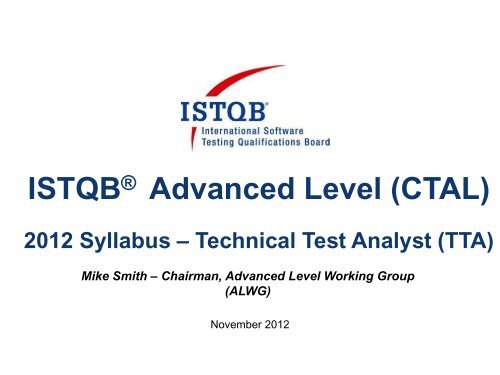CTAL2012_iSQI_Technical Test Analyst V1_0.pdf
CTAL2012_iSQI_Technical Test Analyst V1_0.pdf CTAL2012_iSQI_Technical Test Analyst V1_0.pdf
ISTQB ® Advanced Level (CTAL) 2012 Syllabus – Technical Test Analyst (TTA) Mike Smith – Chairman, Advanced Level Working Group (ALWG) November 2012
- Page 2 and 3: 1 2 3 4 ISTQB® - November 2012 Con
- Page 4 and 5: TTA Business Outcomes - Part 1 An
- Page 6 and 7: 1 2 3 4 ISTQB® - November 2012 Con
- Page 8 and 9: 1 2 3 4 ISTQB® - November 2012 Con
- Page 10 and 11: Testing techniques remains a signif
- Page 12: Advanced 2012 TTA Exam Structure T
ISTQB ® Advanced Level (CTAL)<br />
2012 Syllabus – <strong>Technical</strong> <strong>Test</strong> <strong>Analyst</strong> (TTA)<br />
Mike Smith – Chairman, Advanced Level Working Group<br />
(ALWG)<br />
November 2012
1<br />
2<br />
3<br />
4<br />
ISTQB® - November 2012<br />
Contents<br />
Business Outcomes<br />
TTA Subject Content<br />
Major Changes from 2007 version<br />
2<br />
Exam
ISTQB® - November 2012<br />
ISTQB® – Levels and<br />
Syllabi<br />
3
TTA Business Outcomes –<br />
Part 1<br />
An Advanced <strong>Technical</strong> <strong>Test</strong> <strong>Analyst</strong> can…<br />
TTA1 - Recognize and classify the typical risks associated<br />
with the performance, security, reliability, portability and<br />
maintainability of software systems.<br />
TTA2 - Create test plans which detail the planning, design<br />
and execution of tests for mitigating performance, security,<br />
reliability, portability and maintainability risks.<br />
TTA3 - Select and apply appropriate structural design<br />
techniques to ensure that tests provide an adequate level<br />
of confidence, based on code coverage and design<br />
coverage.<br />
TTA4 - Effectively participate in technical reviews with<br />
developers and software architects applying knowledge of<br />
typical mistakes made in code and architecture.<br />
ISTQB® - November 2012<br />
4
TTA Business Outcomes –<br />
Part 2<br />
An Advanced <strong>Technical</strong> <strong>Test</strong> <strong>Analyst</strong> can…<br />
TTA5 - Recognize risks in code and software architecture<br />
and create test plan elements to mitigate those risks<br />
through dynamic analysis.<br />
TTA6 - Propose improvements to the security,<br />
maintainability and testability of code by applying static<br />
analysis.<br />
TTA7 - Outline the costs and benefits to be expected from<br />
introducing particular types of test automation.<br />
TTA8 - Select appropriate tools to automate technical<br />
testing tasks.<br />
TTA9 - Understand the technical issues and concepts in<br />
applying test automation.<br />
ISTQB® - November 2012<br />
5
1<br />
2<br />
3<br />
4<br />
ISTQB® - November 2012<br />
Contents<br />
Business Outcomes<br />
TTA Subject Content<br />
Major Changes from 2007 version<br />
6<br />
Exam
Risk Based<br />
<strong>Test</strong>ing<br />
Risk<br />
Identification<br />
Risk Assessment<br />
Risk Mitigation<br />
ISTQB® - November 2012<br />
ISTQB® – Advanced Level<br />
<strong>Technical</strong> <strong>Test</strong> <strong>Analyst</strong> (CTAL - TTA 2012)<br />
Structure-Based<br />
<strong>Test</strong>ing<br />
Condition<br />
<strong>Test</strong>ing<br />
Modified Condition<br />
/ Decision<br />
Coverage (MC/DC)<br />
<strong>Test</strong>ing<br />
Path <strong>Test</strong>ing<br />
API <strong>Test</strong>ing<br />
Analytical<br />
Techniques<br />
Static Analysis<br />
Dynamic<br />
Analysis<br />
7<br />
Quality<br />
Characteristics<br />
for <strong>Technical</strong><br />
testing<br />
General<br />
Planning Issues<br />
Security &<br />
Reliability<br />
<strong>Test</strong>ing<br />
Performance<br />
<strong>Test</strong>ing<br />
Resource<br />
Utilization<br />
Maintainability<br />
<strong>Test</strong>ing<br />
Portability<br />
<strong>Test</strong>ing<br />
Reviews<br />
Using Checklist in<br />
Reviews<br />
<strong>Test</strong> Tools and<br />
Automation<br />
Integration and<br />
Information<br />
Interchange<br />
Defining the <strong>Test</strong><br />
Automation<br />
Project<br />
Specific <strong>Test</strong><br />
Tools
1<br />
2<br />
3<br />
4<br />
ISTQB® - November 2012<br />
Contents<br />
Business Outcomes<br />
TTA Subject Content<br />
Major Changes from 2007 version<br />
8<br />
Exam
Major Changes from 2007 Version –<br />
Part 1<br />
A significant refocus on the technical aspects of testing has<br />
been completed. As a result it is now expected that<br />
candidates must be able to read and understand pseudocode.<br />
The basic aspects of testing and the testing process are<br />
now covered in other syllabi.<br />
The test management chapter is relatively short and covers<br />
only the specific issues relating to the <strong>Technical</strong> <strong>Test</strong><br />
<strong>Analyst</strong>.<br />
ISTQB® - November 2012<br />
9
<strong>Test</strong>ing techniques remains a significant part of the<br />
syllabus and accounts for approximately one third of the<br />
training time. Six techniques are covered, including basis<br />
path testing and API coverage. The LCSAJ technique has<br />
been removed from the syllabus.<br />
Content has been significantly reduced due to scoping with<br />
the other syllabi (in particular <strong>Test</strong> <strong>Analyst</strong>). Content has<br />
been significantly reduced due to scoping with the other<br />
syllabi (in particular <strong>Test</strong> <strong>Analyst</strong>).<br />
ISTQB® - November 2012<br />
Major Changes from 2007 Version –<br />
Part 2<br />
10
1<br />
2<br />
3<br />
4<br />
ISTQB® - November 2012<br />
Contents<br />
Business Outcomes<br />
TTA Subject Content<br />
Major Changes from 2007 version<br />
11<br />
Exam
Advanced 2012 TTA Exam<br />
Structure<br />
The exam is still multiple-choice questions, but number of<br />
questions and length of exams have changed from 2007 Version<br />
Module<br />
5 5 5<br />
Number of<br />
questions<br />
Exam Length<br />
(in minutes)<br />
Exam Length +<br />
25%<br />
(in minutes)<br />
Advanced <strong>Test</strong><br />
Manager 65 180 225<br />
Advanced <strong>Test</strong><br />
<strong>Analyst</strong> 60 180 225<br />
Advanced<br />
<strong>Technical</strong> <strong>Test</strong><br />
<strong>Analyst</strong><br />
45 120 150<br />
Pass Mark is 65% for ALL exams, regardless of number of<br />
questions<br />
ISTQB® - November 2012 12



